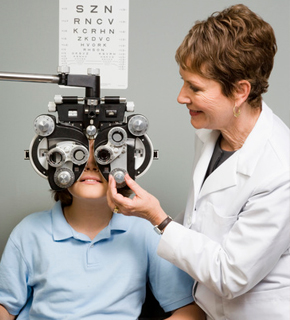An eye exam contains not only checking to see if you need glasses. During a comprehensive eye exam, we not merely determine your prescription for contacts or glasses, we assess your eyes’ capability to work together together (binocular vision). The dilated area of the comprehensive eye exam helps us search for eye diseases including glaucoma, cataract, and macular degeneration; so helping us evaluate your vision for signs and symptoms of systemic disease for example diabetes, high blood pressure, even brain tumors. Adults and youngsters should have routine eye exams to keep prescriptions current also to search for early indications of eye diseases. Early detection can prevent vision loss.
Here’s a listing of a few eye conditions and eye diseases that individuals search for throughout a comprehensive eye exam:
Refractive error: This is your eyes’ “optical” prescription. You will find 3 forms of refractive error, myopia (nearsightedness), hyperopia (farsightedness), and astigmatism (irregular shape to the attention which results in two separate focal points). These conditions could be corrected with glasses, lenses, and refractive surgery.
Presbyopia: This is actually the eyes inability to focus close up. This happens as a result of the aging process. This disorder could be corrected with glasses, contact lenses, and refractive surgery.
Amblyopia: Amblyopia is poor growth and development of central vision because of a turned eye or perhaps a large asymmetry (difference) in refractive error between the two eyes. If untreated, amblyopia can slow visual progression of the affected eye, which can lead to permanent vision loss.

Strabismus: Strabismus is surely an eye that turns inwards or outwards compared to another eye. If not treated, a strabismus can result in amblyopia, and reduce depth perception.
Glaucoma: Glaucoma will be the degeneration with the optic nerve (a nerve tract that connects and transmits information in the eye for the brain) often associated with high eye pressures. During a comprehensive eye exam, we perform numerous tests that reveal whether or not you’ve glaucoma. As there are without any symptoms, it is important to have regular eye exams to prevent permanent vision loss.
Macular degeneration: Macular Degeneration is a ailment that affects the small “sweet spot” (macula) from the retina crucial for acute central vision tasks including reading, driving, and viewing television. A comprehensive examination can detect the problem in its early stages.
Cataracts: A cataract is a clouding with the crystalline lens which rests just behind the coloured part of the eye. Once cataracts develop patients often feel like they are browsing a grimy window pane, which can cause symptoms of glare at night.
Systemic diseases: A thorough eye exam can detect early signs and symptoms of many systemic diseases including diabetes and high blood pressure.
To learn more about Irvine Eye Doctor web portal: look at this now.


